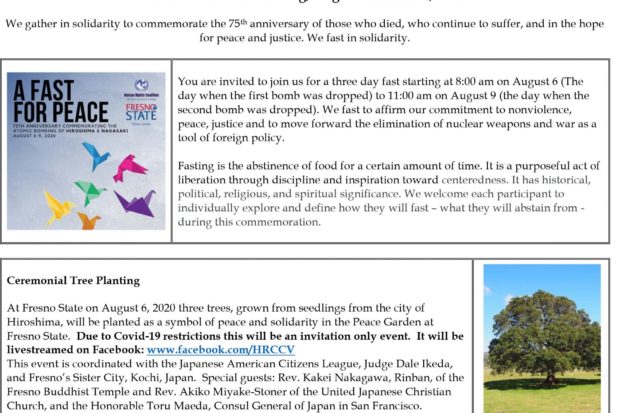
Dr. Sudarshan Kapoor
“On a bright cloudless morning, death fell from the sky and the world was changed. A flash of light and a wall of fire destroyed a city and demonstrated that mankind possessed the means to destroy itself.”
President Barack Obama delivered those powerful words during his visit to Peace Memorial in Hiroshima on May 27, 2016. Obama was the first U.S. President to visit the memorial in Hiroshima, Japan, to pay tribute to those who died as a result of the atom bomb named “Little Boy” that was dropped by American bomber Enola Gay on Hiroshima. It was the first time in human history that a nuclear bomb was used as a weapon of warfare.
This horrible tragedy took place 75 years ago on Aug. 6, 1945. It was a tragedy that took the lives of tens of thousands of innocent people who perished instantly. It is conservatively estimated that 150,000 people died or were missing. The same tragedy occurred on Aug. 9 when another atom bomb named “Fat Man” was dropped by the U.S. military on Nagasaki, destroying the city. Another 75,000 people died or were missing as a result of the bomb and the aftereffects of radiation.
Einstein and Gandhi, the two great pacifists, were very much troubled by the use of the atom bomb. Einstein deplored it and felt the atomic bombing of Japan was unnecessary. Gandhi condemned the bombing altogether, saying “I regard the employment of the atom bomb for the wholesale destruction of men, women and children as the most diabolical use of science.”
Do we have a lesson to learn today for present and future generations with respect to the acquisition and possession of nuclear weapons that are not only cost prohibitive but are a great threat to the human race and civilization?
The resources that are used in the name of defense and the production, maintenance and refurbishing of nuclear weapons are astronomically high and mind-boggling. For the United States alone, the tab runs into the trillions of dollars since the inception of the nuclear era.
According to one source, the United States has about 6,185 nuclear weapons in its possession. Russia has about 6,850. Altogether, there are more than 14,000 nuclear bombs possessed by nuclear nations.
Production for one U.S. B61 bomb costs about $28 million. The maintenance in itself is another story. According to the Union of Concerned Scientists, the production and testing of nuclear weapons in the United States and internationally continues to harm the health, environment and culture of communities around the world. What’s more, the weapons do not make us safer. Our government is breaking treaties and now wants to expand production and resume the testing after a long halt.
These are not the steps toward a peaceful and nuclear-free world. We need to divert our precious limited resources to combat hunger, poverty and illness. We need resources to address the pandemic—not for another bomb or a bomber. According to World Beyond War, just 3% of the U.S. Defense budget or 1.5% of the world’s defense budget will go a long way to wipe out hunger and poverty. Doing so will contribute significantly to the achievement of sustainable global goals as developed by the United Nations.
To create awareness about building a peaceful and just world community, addressing threats of nuclear weapons and, eventually, their elimination and paying our tribute to the victims of nuclear holocaust and the survivors (also known as Hibakusha), Fresno State plans to commemorate the 75th Anniversary of the Hiroshima and Nagasaki Bombings in the Peace Garden on Aug. 6, in collaboration with the Japanese American Citizen League (JACL) and the Human Rights Collation of the Central Valley.
The commemoration will include a Tree Planting Ceremony. Three trees that are grown from the seedlings of a camphor tree that survived the atom bomb in Hiroshima have been donated by the Japanese American Community of Fresno to be planted in the Peace Garden.
The Honorable Toru Maeda, consul general of Japan, will be the guest speaker in addition to dignitaries from Fresno State and the local Japanese American community. Judge Dale Ikeda, honorary consul general of Japan in Fresno, will be the emcee. The event, which starts at 8 a.m., is by invitation only because of the restrictions due to the pandemic.
The commemoration includes a three-day “Fast for Peace,” which also starts at 8 a.m. on Aug. 6 (the day when the first bomb was dropped on Hiroshima) and continues until 11 a.m. on Aug. 9 (the day the second bomb was dropped on Nagasaki).
Fasting is the abstinence of food for a certain amount of time. It is a purposeful act of liberation through discipline and inspiration toward centeredness. The fast is an affirmation of our commitment to nonviolence, peace, justice and our resolve to eliminate nuclear weapons and war as a tool of foreign policy. All are invited to join the fast.
*****
Dr. Sudarshan Kapoor is a Fresno State professor emeritus, and chair and founder of the Human Rights Coalition of the Central Valley.
